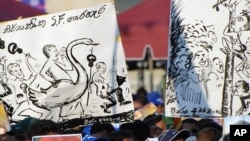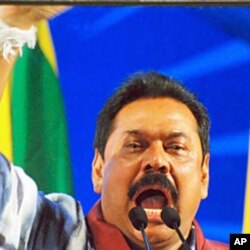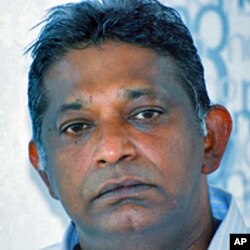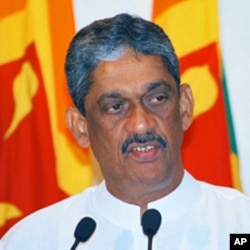In Sri Lanka, The two proclaimed heroes of Sri Lanka's recently-ended civil war are facing off in the country's presidential election Tuesday. Both openly accuse the other of war crimes. The election is being closely watched by international agencies and donor governments.
During his final election rally President Mahinda Rajapaksa sat with key political allies and Buddhist monks on a stage replicating an ancient royal palace.
Singers praised Mr. Rajapaksa as both a man of the people and a modern day king who vanquished the rebel Tamil Tigers, ending a quarter century of civil war.
The former general to whom others give credit for the military victory, Sarath Fonseka, is the main contender vying to unseat the incumbent. He leads a diverse opposition coalition with seemingly incompatible views on crucial issues. The close contest has gone beyond just nasty political rhetoric alleging war crimes, corruption and incompetence.
Analyst Pakiasothy Saravanamuttu of the Center for Policy Alternatives says the campaign has seen hundreds of serious acts of violence, including several killings.
"So what it does suggest is that there is a violence embedded in the political culture of the country and that it is a zero-sum political culture. And, therefore, literally, not just metaphorically, parties go to war with each other in an electoral contest," he said.
Pakiasothy says a big election day concern is how extensive balloting in Tamil-dominated districts will be disrupted.
"The issue here is going to be whether there will be violence and intimidatory activity which will prevent people from getting to polling stations," he said.
General Fonseka predicts desperate supporters of President Rajapaksa will do exactly that.
"They'll come on the road on election day. There will be a lot of violence to intimidate the people, to turn the voters back because there's no other way out for them. They already lost the election," he said.
Despite the threats, retired Supreme Court Justice C.V. Wigneswaran tells VOA News he has been urging his fellow Tamils to replace the legacy of Tamil rebel bullets with ballots.
"Despite all these heavy odds against them, of various groups trying to prevent them [from voting] or even Army collaboration in these matters, they must come forward and go to vote," he said.
The former judge says he spurned offers to run for President as a Tamil candidate, saying it is obvious only a Sinhalese can win. He says the former general who waged war on the Liberation Tigers of Tamil Eelam is the preferred choice at the ballot box for Sri Lanka's minorities.
Fonseka enjoys support of many of the members of Parliament from the Tamil National Alliance, the political wing of the defeated rebels.
In his last speech to supporters before campaigning drew to a close, President Rajapaksa reached out to the hundreds of thousands of Tamils displaced by the blood-filled chaos of the civil war's final months last year.
The President says he will win the hearts of the Tamils in the North and the East and make certain terrorism does not resurface.
Both Mr. Rajapaksa and his former top general express confidence they will be victorious.
For the challenger, it has been a difficult task to get out his message to the masses.
The international organization Reporters Without Borders says state media, during the campaign, allocated more than 98 percent of its news and current affairs air time to the president. The group says those figures put Sri Lanka in the same league as the regimes in Burma or North Korea.







